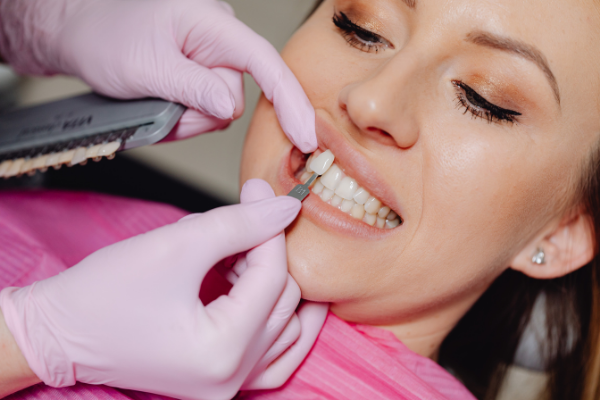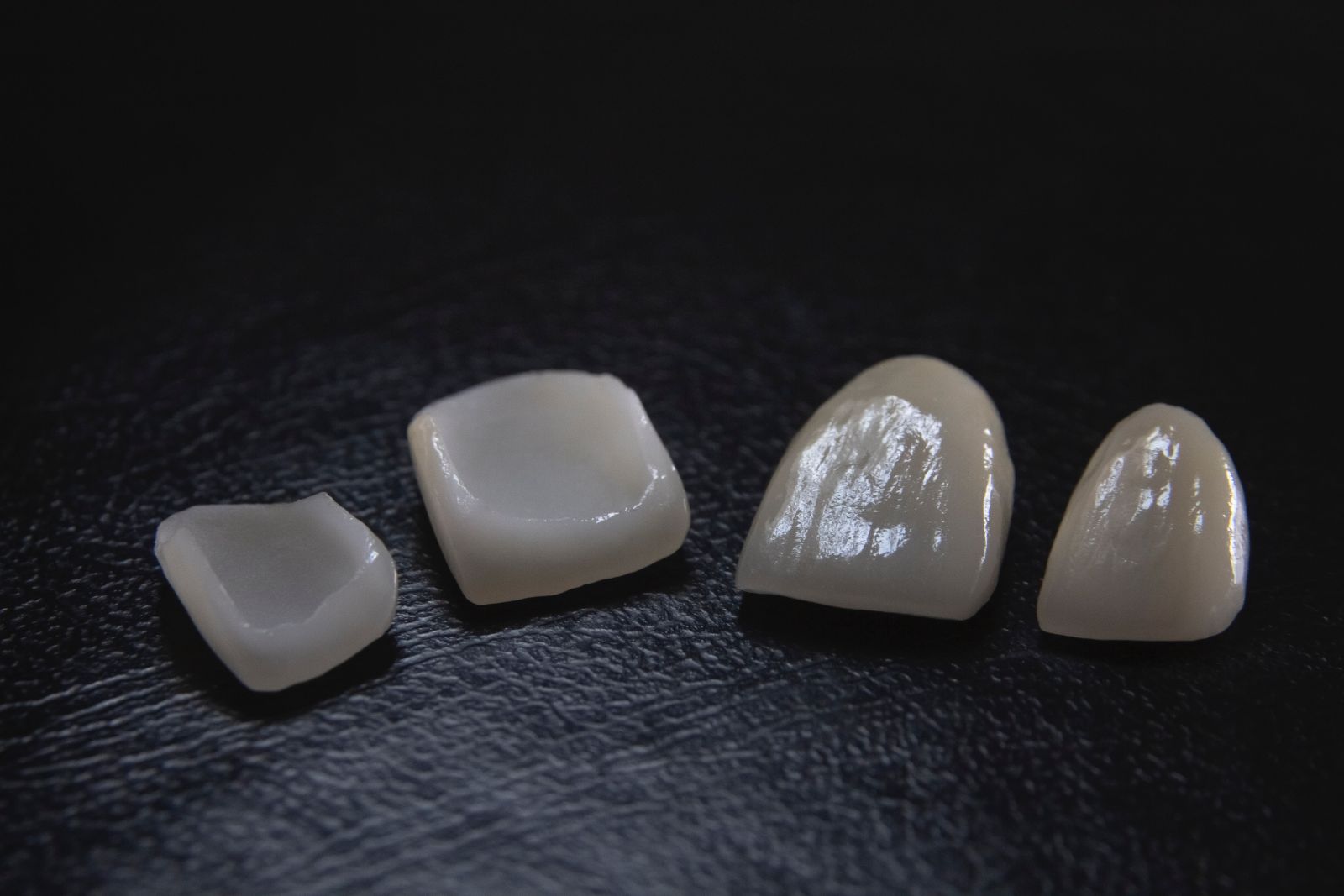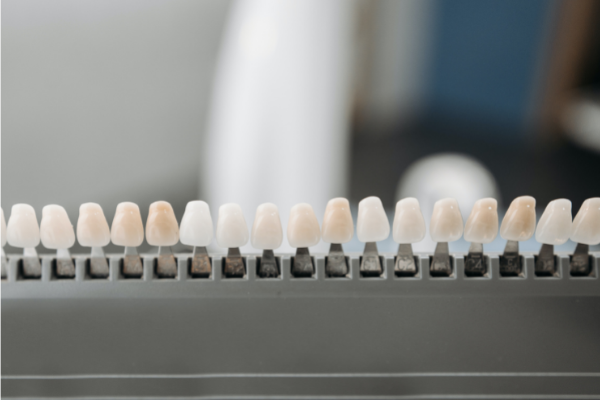Guide to Porcelain Veneers
Guide to Porcelain Veneers
Porcelain veneers have become a popular cosmetic dental option for addressing minor to moderate concerns like chips, stains, and small gaps between teeth. These thin, custom-made shells offer a versatile solution for enhancing the appearance of your smile while maintaining a natural look.
At Park Practice, we’re committed to helping our patients understand the right treatment option for their specific needs. That's why in this guide, we’ll cover everything you need to know about porcelain veneers — from how they work to what you can expect from the process.
Read on to find out if veneers could be the best choice to achieve your ideal smile!

What are porcelain veneers?
Porcelain veneers are custom-made tooth-coloured shells that are used to cover the surface of the front teeth to improve the aesthetic appearance of your smile.
This procedure is minimally invasive and the treat can all be done in the same day, making them viable solution to the following cosmetic issues:
-
Stained teeth
-
Chipped tooth
-
Misaligned teeth
-
Teeth gaps
Despite their wafer-thin appearance, veneers can help improve the strength of your natural teeth by keeping the outer layer of enamel protected. Not only do veneers cover up stains, chips or cracks, they also prevent them from worsening.
Porcelain veneers are made to match the shade of your natural teeth so that they blend in seamlessly with your smile. Some patients choose to combine veneers with teeth whitening to achieve a bright new smile without the need for any invasive or timely surgeries.
Different types of dental veneers
Dental veneers in the UK come in a range of materials and styles, each offering unique benefits depending on your needs and preferences. Understanding the different types available, including porcelain and composite veneers, can help you make an informed choice about which option best aligns with your dental goals.
Let’s check out the main types of veneers below and what makes each one distinct.

Porcelain veneers
Porcelain veneers are the most attractive and popular type of veneers, and with good reason.
As mentioned earlier, these veneers are tooth-coloured wafer-thin shells that are designed to cover the front surface of your teeth. They are highly durable and resistant to stains, and are often used to improve the appearance of your teeth and fix various cosmetic issues.
|
Advantages of porcelain veneers |
Disadvantages of porcelain veneers |
|
Very durable |
More expensive than composite veneers |
|
Highly resistant to stains |
Porcelain veneers prep is longer than composite veneers |
|
Can significantly improve the appearance of teeth |
Cannot be reversed once placed |
|
Can last for many years with proper care |
Composite veneers
Composite veneers are another great option and slightly more cost-effective choice compared to porcelain veneers.
A composite veneer is made of tooth-coloured resin material that is applied directly to your teeth. Like porcelain veneers, composite veneers are specifically designed for treating dental issues such as cracks, discolouration, and chipped teeth.
This type of veneers is generally less expensive than porcelain veneers as they do not require as much tooth preparation. However, composite veneers are also less durable and may not last as long as their porcelain counterpart.
|
Advantages of composite veneers |
Disadvantages of composite veneers |
|
Can be applied in a single visit |
Generally not as durable as porcelain veneers |
|
Do not require as much tooth preparation as porcelain veneers |
More prone to staining and discolouration than porcelain veneers |
|
Less expensive than porcelain veneers |
May require more maintenance and touch-ups over time |
Procedure for porcelain veneers
The process of getting porcelain veneers is fairly straightforward but will require multiple visits to your Glasgow dental practice to ensure they are measured and shaded specifically for your teeth.
The procedure for getting porcelain veneers can be broken down into 6 simple steps:
-
Initial consultation: During your initial consultation, your dentist will examine your teeth and discuss your personal treatment goals. They will assess whether veneers are a suitable option for you and explain the benefits and risks of the procedure.
-
Preparation for veneers: If you decide to proceed with the treatment, your dentist will prepare your teeth for the veneers by removing a small amount of enamel from the front of your teeth. This prepping for veneers is necessary to ensure that they fit properly and blend perfectly with the rest of your teeth.
-
Impressions: Your dentist will then take impressions of your teeth, which will be used to create custom-made veneers. The impressions will be sent to a dental laboratory, where the veneers will be made. This process can take up to a few weeks.
-
Temporary veneers: In the meantime, your dentist may place temporary veneers on your teeth to protect them and improve their appearance while waiting for the custom-made veneers to arrive.
-
Bonding the veneers to the teeth: When your porcelain teeth are ready, your dentist will remove the temporary veneers and clean your teeth. They will then apply a special cement to the back of the permanent veneers and place them on your teeth. A special light will be used to harden the cement to firmly bond the veneers to your teeth.
-
Aftercare and follow-ups: To make sure your new veneers last as long as possible, it’s essential that you take aftercare seriously. This includes regular brushing and flossing, as well as using a non-abrasive toothpaste. You should also visit your dentist for regular check-ups and cleanings to check your new veneers are operating as expected.
Price for porcelain veneers
Like a lot of cosmetic dental procedures, porcelain veneers cost in the UK can vary depending on a variety of factors, such as:
-
The number of veneers needed
-
The type of veneers you choose
-
The location of your dentist.
-
The amount of prep work needed
At The Park Practice in Glasgow, we offer very competitive rates for porcelain veneers, with our aesthetic porcelain veneers ranging from £350 to £525.
FAQs on porcelain veneers
How long do veneers last?
Porcelain veneers are last longer than composite veneers. With proper aftercare and good oral hygiene practice, porcelain teeth typically last for 10 to 15 years. However, they can last longer or shorter depending on factors such as your oral hygiene habits, the quality of the veneers, and your bite.
Composite veneers, on the other hand, only tend to last for around 5 years before needing to be replaced or updated.
Are veneers painful?
The process of getting veneers is non-invasive and usually not painful. Your dentist will numb your teeth and gums with a local anaesthesia to ensure that you are comfortable during the procedure. Some people may experience sensitivity or discomfort after the anesthetic wears off, but this usually goes away within a few days.
How do porcelain veneers work?
At Park Practice, our team will take your facial shape, hair colour and skin complexion into account when creating your custom porcelain veneers. This is to ensure all patients finish their treatment with the best possible result.
We’ll also show you how you will look with our veneers in place before any work is completed, giving our patients peace of mind that porcelain veneers are defiantly for them.

Quality porcelain veneers Glasgow
If you're considering porcelain veneers or simply want to learn more about your options, our experienced dentists at Park Practice are here to help.
Schedule a consultation with us to discuss your goals and find the best veneer solution to achieve the smile you’ve always wanted.
Let’s work together to create a beautiful, confident smile that lasts!


